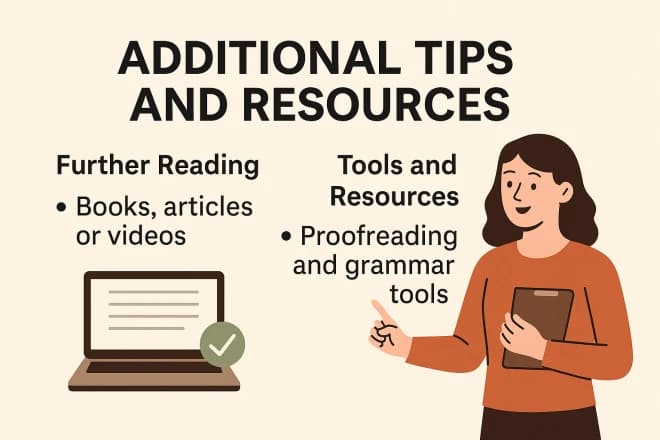Unlock Insights: Find the Answers You Seek on Our Blog
Galentine’s Day Poem: Celebrating Female Friendship Through Poetry
By Evelyn Sterling
Galentine’s Day, a term many might have stumbled upon, blossoms in significance each February. This celebration, emerging from popular culture, now marks a pivotal day of affection and recognition. It’s a day dedicated exclusively to celebrating female friendships. Falling on February 13th, it serves as a precursor to Valentine’s Day. Unlike Valentine’s Day, with its romantic connotations, Galentine’s Day is about cherishing platonic bonds. It’s a day where women gather to honor the strength, compassion, and resilience in their relationships with each other.
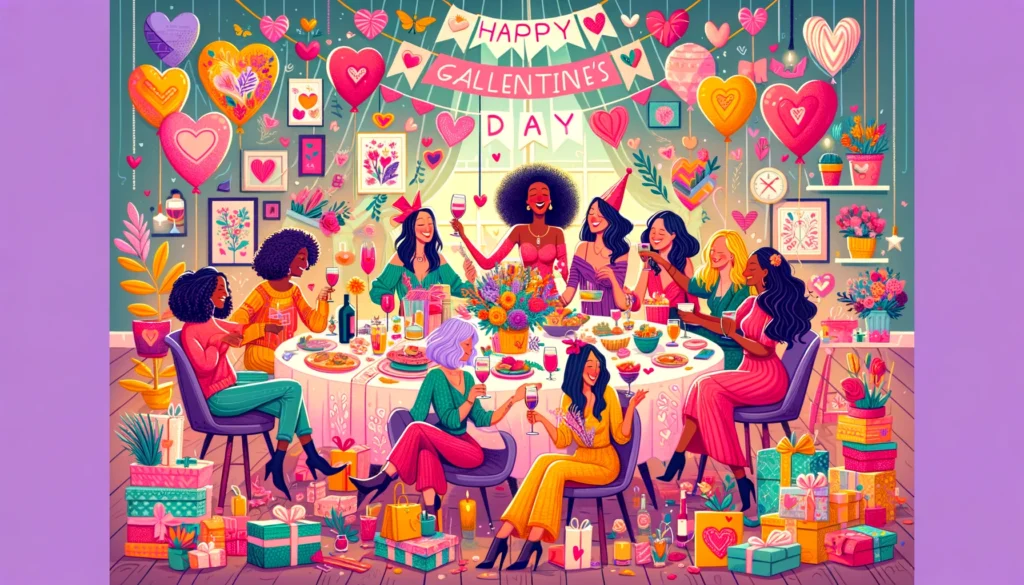
In the realm of Galentine’s Day, poetry plays a vital role. Why poetry, one might ask? Poetry, with its rhythmic and evocative nature, captures the essence of friendship in a way few other forms of expression can. Through its verses, it traverses the deep emotional landscapes of human connections. Poems about friendship, or as we can say, “Galentine’s Day poems,” often delve into themes of support, understanding, and unbreakable bonds. They reflect on shared experiences, laughter, and even challenges that strengthen these ties.
The fusion of Galentine’s Day with poetry offers a unique canvas. Here, words weave together the stories and experiences of women. These poems become vessels carrying the depth of their shared journeys. They act as mirrors reflecting the beauty of these connections. Simple yet profound, these poems remind us of the joy and strength found in female friendships. They celebrate the unspoken understanding, the shared laughter, and the shoulder always available in times of need.
Incorporating Galentine’s Day poems into the celebration elevates it. It transforms a simple gathering into a memorable and emotionally rich experience. Whether it’s through reading famous poems about friendship or creating personal verses for each other, poetry becomes a bridge. It connects hearts and minds, honoring the timeless beauty of female friendships.
As we explore the significance of Galentine’s Day and the role of poetry in this celebration, we delve into a world where words are not just spoken or written. They are felt, lived, and cherished, much like the friendships they celebrate.
The Historical and Cultural Significance of Galentine’s Day
Galentine’s Day, a concept that might seem modern, has roots that trace back more than a decade. Originating from a 2010 episode of the American television show “Parks and Recreation,” this day was introduced by the character Leslie Knope, played by Amy Poehler. In the show, Leslie gathers her female friends for a brunch full of waffles and love, declaring it “only the best day of the year” – a day to celebrate the women in her life.

This fictional celebration quickly resonated with audiences and sparked a real-world counterpart. It transcended the boundaries of the small screen to become a cultural phenomenon. Today, Galentine’s Day is celebrated across various demographics, transcending age and backgrounds. It’s recognized as a day for women to affirm their friendships and to appreciate the female figures in their lives – mothers, sisters, friends, and colleagues.
In cultural analysis, Galentine’s Day is seen as a response to the often commercially-driven Valentine’s Day. It shifts the focus from romantic love to platonic love, emphasizing the importance of female support systems. This day has been marked by gatherings, gift exchanges, and, notably, the sharing of “Galentine’s Day poems.” These poems often highlight themes of empowerment, solidarity, and the enduring strength of female friendships.
Experts in social dynamics observe that Galentine’s Day reflects a broader movement of women celebrating each other’s achievements and roles in society. It’s a day that breaks the conventional narrative, highlighting the power of non-romantic relationships. This shift is significant in a society where romantic relationships have traditionally been given more importance.
Galentine’s Day, with its emphasis on genuine connections, has also impacted how we perceive and celebrate relationships. It encourages inclusivity and recognition of diverse forms of love and support. The day has become a symbol of unity, resilience, and joy among women, creating a space where their friendships are not just acknowledged but exalted.
As “Galentine’s Day poems” circulate more widely each year, they weave a tapestry of shared experiences and emotions. These poems, rich in expression and sentiment, are a testament to the evolving narrative of female friendships. They reflect a cultural shift towards valuing and celebrating the myriad ways women support and uplift each other.
In conclusion, Galentine’s Day, though rooted in popular culture, holds substantial historical and cultural significance. It’s a day that challenges the traditional norms and brings to the forefront the indispensable role of female friendships in our society.
Exploring Female Friendship in Poetry
Poetry has long been a medium where the intricacies of human relationships are explored and celebrated. When it comes to female friendship, poets across ages have captured its essence, weaving words that resonate deeply with readers. In “Galentine’s Day poems,” this tradition continues, focusing on the unique bond shared among women.
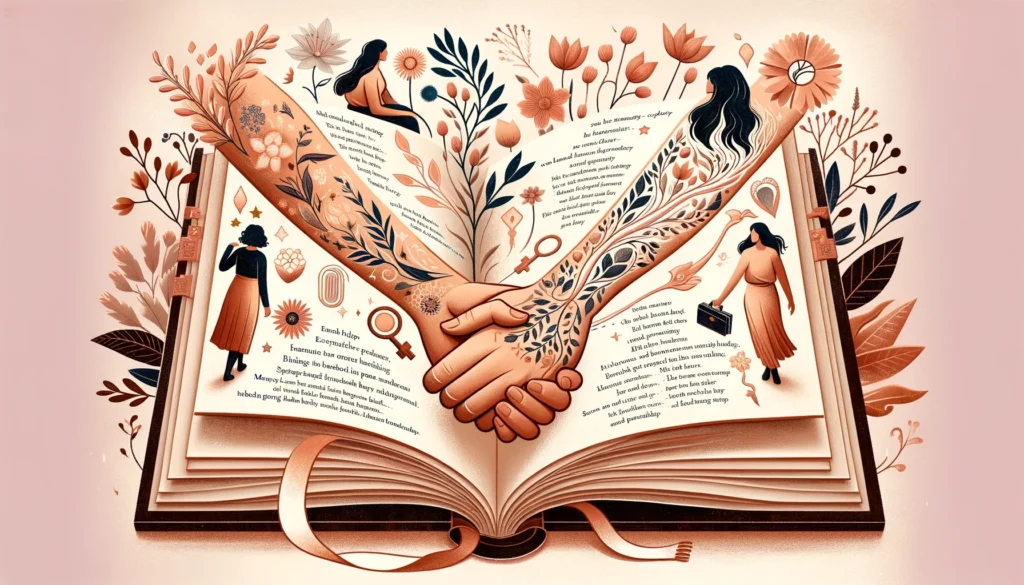
Renowned poet Maya Angelou, in her works like “Phenomenal Woman,” encapsulates the strength and beauty of women. Though not explicitly about friendship, her poems offer a powerful backdrop to understanding the depth of female bonds. They speak to the resilience and solidarity that underpin these relationships. Angelou’s works are often cited in discussions about Galentine’s Day, symbolizing the empowerment that comes from female camaraderie.
Similarly, Emily Dickinson’s poetry, with its introspective and often intimate tone, sheds light on the emotional depth of friendships. Her writings, though veiled in mystery, are thought to reflect her own connections with women in her life. Literary critics have long analyzed her work, drawing connections between her poetic expressions and the complexities of female friendship.
Modern poets like Rupi Kaur have also contributed significantly to this genre. Kaur’s poems in “Milk and Honey” and “The Sun and Her Flowers” delve into themes of growth, healing, and the supportive nature of female relationships. Her accessible style and relatable themes make her a popular reference in contemporary discussions about Galentine’s Day poems.
Academic studies in the field of literature and sociology have examined the portrayal of female friendship in poetry. These studies often highlight how poetry transcends mere words, becoming a tool for women to express and affirm their bonds. They note that poems about female friendships are not just about shared experiences; they are about a shared understanding of the world and mutual support that withstands societal pressures.
In essence, poetry celebrating female friendship is more than just verses on a page. It’s a reflection of life, of the unbreakable bonds that form between women. These poems, whether from centuries past or from the modern era, resonate because they speak to the universal experience of women supporting, uplifting, and finding solace in each other.
Galentine’s Day poems, in this context, are not just seasonal writings. They are part of a larger narrative that honors and recognizes the enduring power of female friendships. They stand as testaments to the depth, complexity, and beauty of these relationships, echoing through ages and still relevant in today’s world.
Crafting Your Galentine’s Day Poem
Creating a Galentine’s Day poem is a beautiful way to express the value of female friendships. Whether you’re a seasoned poet or new to the craft, these tips and insights from famous poets can guide you in crafting a heartfelt piece.

1. Start with Genuine Emotions: As Maya Angelou once said, “People will forget what you said, people will forget what you did, but people will never forget how you made them feel.” Begin your poem by reflecting on the feelings and memories shared with your friends. Authenticity resonates in poetry, making your words more impactful.
2. Embrace Simplicity: Remember Emily Dickinson’s approach to writing. She often used simple language to convey deep and complex emotions. Your poem doesn’t need to be laden with complicated words. Sometimes, the most straightforward expressions are the most powerful.
3. Use Vivid Imagery: Draw inspiration from poets like Rupi Kaur, known for creating strong images with few words. Use imagery to paint a picture of your friendship – the laughs, the tears, and the unspoken understanding.
4. Play with Structure: Don’t be afraid to experiment with the structure of your poem. Free verse, a style that doesn’t adhere to specific patterns, can offer more freedom to express your thoughts. As Walt Whitman demonstrated in his works, breaking traditional poetic structures can lead to profound expression.
5. Read and Revise: As Ernest Hemingway advised, “The only kind of writing is rewriting.” Once you’ve penned your poem, take time to read it over and make revisions. A well-crafted poem often goes through several edits before it feels right.
6. Share with Your Friends: Ultimately, the goal of a Galentine’s Day poem is to share it with your friends. It’s about celebrating the bond you share. Don’t worry about achieving perfection; it’s the sentiment that counts.
Remember, a Galentine’s Day poem is more than just words; it’s a tribute to the enduring strength and beauty of female friendships. It’s an opportunity to tell your friends how much they mean to you in a way that’s uniquely personal and heartfelt.
AI Poem Generators: The Future of Creative Writing
In the realm of creative writing, especially for occasions like Galentine’s Day, AI poem generators are emerging as a revolutionary tool. These generators, harnessing the power of artificial intelligence, are redefining how we approach the art of poetry.

How AI Poem Generators Work: At their core, AI poem generators use algorithms and machine learning techniques to create poetry. They analyze vast collections of existing poems to understand structures, themes, and styles. Once trained, these AI systems can generate new poems based on given prompts or themes, such as “Galentine’s Day poem.” This technology is continually evolving, becoming more adept at mimicking human-like creativity and expression.
Advantages of AI Poem Generators: One of the key benefits of using AI for poetry writing is the ability to generate creative ideas quickly. For those experiencing writer’s block or seeking new inspiration, AI can provide a starting point that can be further refined and personalized. Additionally, AI generators offer a vast range of styles and tones, making them versatile tools for various poetic needs.
Expert Insights: Technology experts and literary scholars are beginning to recognize the potential of AI in creative fields. As stated by experts in computational creativity, AI doesn’t aim to replace human poets but rather to augment and inspire human creativity. Recent studies in AI and literature suggest that these tools can help individuals explore new poetic forms and expressions they might not have considered otherwise.
Ethical Considerations: While embracing AI in poetry, it’s essential to consider the ethical aspects. The authenticity of AI-generated poems and the role of AI in creative processes are topics of ongoing debate. However, when used responsibly, AI poem generators can be powerful tools for enhancing human creativity.
Applying AI to Galentine’s Day Poems: In the context of Galentine’s Day, AI poem generators can offer fresh perspectives and unique expressions to celebrate female friendships. They can assist in crafting poems that capture the essence of this special day, adding an innovative twist to traditional poetry writing.
In summary, AI poem generators represent a fascinating intersection of technology and art. For Galentine’s Day and beyond, they offer a unique way to explore and express the rich tapestry of human emotions and experiences.
Showcasing Examples of Galentine’s Day Poems
Galentine’s Day is not just about celebrating female friendships; it’s also about expressing these bonds through heartfelt words. Here, we showcase examples of Galentine’s Day poems that capture the essence of this special day, along with insights from poets and critics.
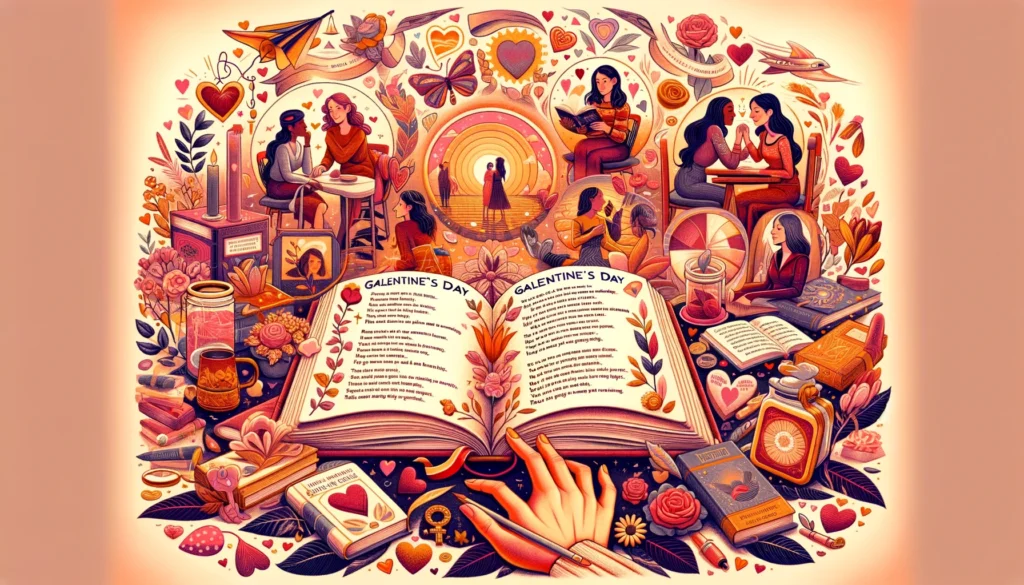
Example 1: “Sisters of Heart” In this poem, the poet delves into the theme of sisterhood beyond blood relations. The lines, “Not born of the same root, yet our hearts entwine, Sharing laughs and tears, in sunshine and rain,” encapsulate the depth of chosen sisterhood. Critics have praised this piece for its vivid imagery and emotional depth, highlighting the strength of bonds formed by choice and experience.
Example 2: “The Laughter We Share” This poem celebrates the joy and light-hearted moments in female friendships. With phrases like, “In every giggle, a memory blooms,” it emphasizes the importance of joyous moments shared among friends. Literary analysts often point out how such poems use simple language to convey profound truths about companionship.
Analysis from Poets and Critics: Renowned poets and critics have often emphasized the importance of authenticity in friendship poems. As one critic notes, “The beauty of a Galentine’s Day poem lies in its truthfulness and the rawness of its emotions. It’s about capturing the real essence of friendship.” These poems are not just verses; they are reflections of shared experiences and emotions.
The poems above demonstrate how words can be a powerful tool in honoring and celebrating female friendships. Whether they are about shared joys, enduring support, or the beauty of understanding, Galentine’s Day poems resonate because they speak from the heart. They are a tribute to the unbreakable bonds that women share, a testament to the strength and resilience found in these relationships.
In essence, Galentine’s Day poems are more than just seasonal expressions; they are timeless odes to the power and beauty of female friendships. They remind us of the incredible impact these relationships have on our lives and the joy they bring.
As we reflect on the essence of Galentine’s Day, the role of poetry in celebrating female friendship becomes unmistakably clear. “Galentine’s Day poems” are not just words arranged in rhythm; they are powerful expressions of the bonds that women share. These poems offer a unique lens through which the depth, resilience, and joy of female friendships are viewed and celebrated.
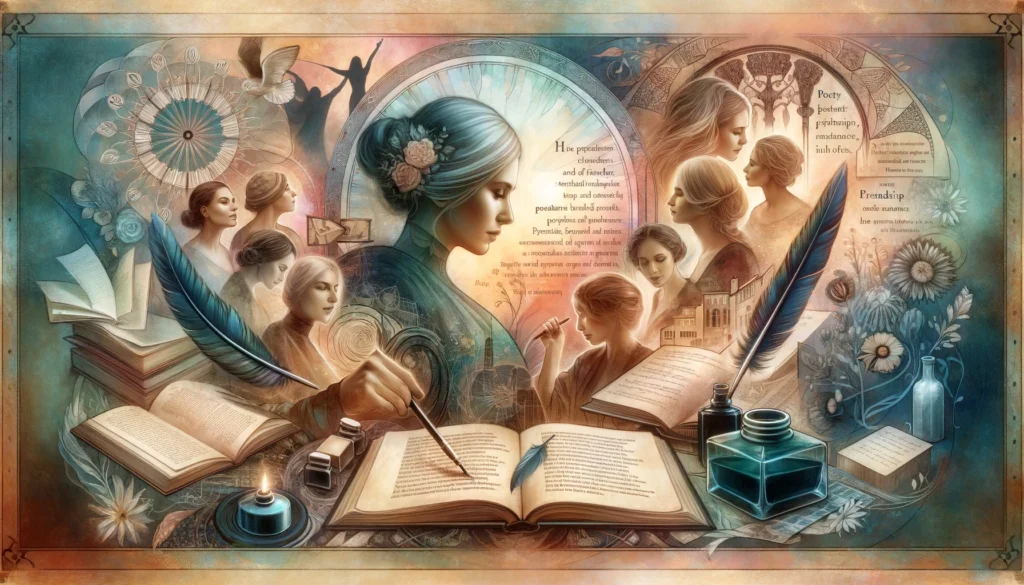
Studies in the fields of literature and psychology have underscored the power of poetry as a medium for emotional expression and connection. Experts suggest that poetry can evoke empathy and understanding, bridging gaps and deepening relationships. In the context of Galentine’s Day, poems become a conduit for expressing the often indescribable facets of friendship.
Furthermore, the incorporation of poetry into this celebration enriches the experience. It transforms a simple acknowledgment into a profound celebration of female bonds. Whether through traditional verses or AI-generated poems, the essence remains the same: to honor and celebrate the irreplaceable role of female friends in our lives.
In conclusion, Galentine’s Day, enriched with the tradition of sharing poems, offers a moment to pause and appreciate the women who stand with us. It’s a day to acknowledge the laughter, support, and strength found in female friendships. As we move forward, let us continue to celebrate these bonds with words that resonate with our shared experiences and emotions. After all, every Galentine’s Day poem is a tribute to the enduring power of friendship, a testament to the unspoken understanding and unwavering support that define the beautiful journey of female camaraderie.
Appendix: Resources and Reading Suggestions
For those inspired by the idea of crafting or exploring more about Galentine’s Day poems, the following is a curated list of resources. These include books, websites, and papers, along with recommendations from experts and institutions in the field, to further enrich your understanding and creativity.
Books:
- “The Sun and Her Flowers” by Rupi Kaur – A collection of poems exploring themes of growth, healing, and female solidarity.
- “Ariel” by Sylvia Plath – Offers deep insights into the complexities of female identity and relationships.
- “Sister Outsider” by Audre Lorde – Though not exclusively poetry, this collection of essays and speeches delves into issues related to female friendships and the female experience.
Academic Papers and Journals:
- “The Role of Poetry in Emotional Healing” – A study discussing how poetry can be used as a therapeutic tool in understanding and expressing emotions.
- “Women’s Writing and the Friendship Paradigm” – An analysis of how female friendships are portrayed in literature and poetry.
Expert Recommendations:
- The Academy of American Poets recommends exploring diverse voices in poetry to truly grasp the breadth of experiences in female friendships.
- Literary critics often suggest reading across different eras to understand the evolution of themes in women-centric poetry.
These resources offer a blend of theoretical and practical insights into poetry, specifically relating to the themes of Galentine’s Day and female friendship. Whether you’re a reader, a writer, or just someone interested in the power of words, these resources can guide and inspire you.
AI Tools Categories
Browse all AI tools by category
All AI Tools
229Amazon
5AI Writing Generator
85Article & Content Writing
35Branding & Identity
54Content Generation
170Creative Ideas
32Educational Resources
34E-commerce
14Etsy
6Events & Celebrations
13Facebook
6Gaming & Fun
5Instagram
3Lifestyle & Personal
8LinkedIn
6Marketing & SEO
40Poem & Lyrics Writing
19Professional Documents
31Social Media
44Story & Book Writing
49Text Effects
14TikTok
7Twitter
3Writing Enhancement
36YouTube
11
Highly rated and most popular AI tools curated by our experts
Recently added AI tools that are gaining traction
- AI Post Generator

- AI Bullet Point Generator

- AI Discussion Post Generator

- AI 2 Weeks Notice Letter Generator

- AI Content Creation Ideas Generator

- AI Radio Ad Script Generator

- AI Podcast Script Generator

- AI Resume Objective Generator

- AI Resume Headline Generator

- AI Password Generator

- AI Snapchat Caption Generator

- AI Snapchat Username Generator

- AI Pinterest Board Name Generator

- AI LinkedIn Experience Description Generator

- AI Twitter Hashtag Generator

- AI YouTube Short Idea Generator

we prioritize displaying the latest content closely related to the current blog post.






